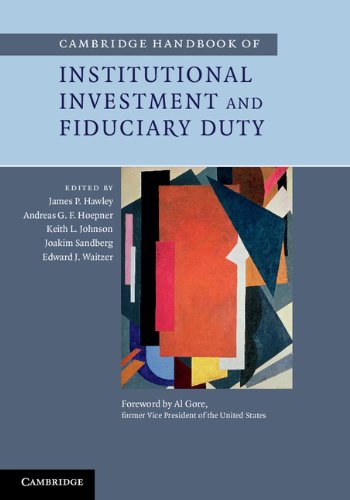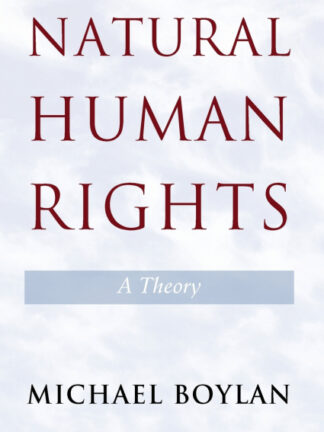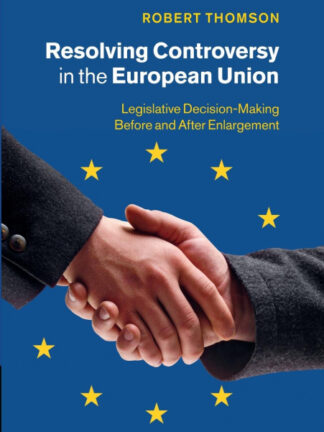Descripción
Cambridge Handbook of Institutional Investment and Fiduciary Duty *
The Cambridge Handbook of Institutional Investment and Fiduciary Duty is a comprehensive reference work exploring recent changes and future trends in the principles that govern institutional investors and fiduciaries. A wide range of contributors offer new perspectives on the dynamics that drive the current emphasis on short-term investment returns.
Moreover, they analyze the forces at work in markets around the world which are bringing into sharper focus the systemic effects that investment practices have on the long-term stability of the economy and the interests of beneficiaries in financial, social and environmental sustainability.
This volume provides a global and multi-faceted commentary on the evolving standards governing institutional investment, offering guidance for students, researchers and policy-makers interested in finance, governance and other aspects of the contemporary investment world. It also provides investment, business, financial media and legal professionals with the tools they need to better understand and respond to the new financial market challenges of the twenty-first century.
ÍNDEX
Introduction
Part I. Fiduciary Duty: A Global Outlook
Part II. Fiduciary Duty and the Landscape of Institutional Investment
Part III. Challenging Conventional Wisdom on Fiduciary Duty
Part IV. Towards a Broader Interpretation of Fiduciary Duty
Part V. Beneficiaries’ Roles and Viewpoints
Part VI. Fiduciary Duty and Governance
DERECHO POLÍTICO Y CONSTITUCIONAL
1. Introduction
Part I. Fiduciary Duty: A Global Outlook:
2. The public fiduciary – a Canadian perspective
3. The basis of fiduciary duty in investment in the United States
4. Governance and accountability in UK pension schemes
5. Institutional investment and fiduciary duty in Australia
6. The regulation of institutional investment in Sweden: a role-model for the promotion of responsible investment?
7. The Dutch pension system
Part II. Fiduciary Duty and the Landscape of Institutional Investment:
8. The philanthropic fiduciary
9. Paradigm lost: employment-based defined benefit plans and the current understanding of fiduciary duty
10. Economically targeted investing: changing of the guard
11. Institutional investment in the European Union Emissions Trading Scheme
12. Have institutional fiduciaries improved securities class actions? A review of the empirical literature on the PSLRA’s Lead Plaintiff Provision
13. The future of fiduciary obligation for institutional investors
Part III. Challenging Conventional Wisdom on Fiduciary Duty:
14. Is the search for excessive alpha a breach of fiduciary duty?
15. Fiduciary duty and sin stocks: is vice really nice?
16. Whose risk counts?
17. Sustainability, financial markets and systemic risk
18. Uncertain times, plural rationalities and the pension fiduciary
19. Emotional finance and the fiduciary responsibility of asset managers
Part IV. Towards a Broader Interpretation of Fiduciary Duty:
20. Fiduciary duty and the search for a shared conception of sustainable investment
21. Pension fund fiduciary duty and its impacts on sustainable investing
22. Reason, rationality and fiduciary duty
23. Socially responsible investment and the conceptual limits of fiduciary duty
24. Fiduciary duty at the intersection of business and society
25. Challenging conventional wisdom: the role of investment tools, investment beliefs and industry conventions in changing our interpretation of fiduciary duty
Part V. Beneficiaries’ Roles and Viewpoints:
26. The voice of the beneficiary
27. Understanding the attitudes of beneficiaries: should fiduciary duty include social, ethical and environmental concerns?
28. Operationalizing socially responsible investment: a non-financial fiduciary duty problem
29. The preferences of beneficiaries: what can we learn from research on retail investors?
Part VI. Fiduciary Duty and Governance:
30. Investors and global governance frameworks: broadening the multi-stakeholder paradigm
31. Investment fiduciaries, the role of the public corporation, and greater commitments to sustainability: signals from the corporate board
32. Reporting and standards: tools for stewardship
33. US corporate governance, fiduciary success and stable economic growth
34. Fulfilling fiduciary duties in an imperfect world – governance recommendations from the Stanford Institutional Investor Forum
35. Addressing the participation gap in institutional investment: an assessment framework and preliminary results
36. The costs of fiduciary failure – and an agenda for remedy
Index.
James P. Hawley, is Professor and Director of the Elfenworks Center for the Study of Fiduciary Capitalism at Saint Mary’s College, California. He is the author (or co-author) of well over thirty scholarly articles, as well as four books, on a variety of topics, including corporate governance, responsible investment, the international monetary and financial system, and environmental issues.
Andreas G. F. Hoepner, is an Associate Professor of Finance at the ICMA Centre of Henley Business School at the University of Reading, where he directs the i-finance laboratory. He is also currently serving as the Senior Academic Fellow to the United Nations supported Principles for Responsible Investment and as Senior Associate to the University of Cambridge’s Programme for Sustainability Leadership.
Keith L. Johnson, represents pension funds and institutional investors globally on fiduciary, investment, corporate governance and related litigation matters. He chairs the Institutional Investor Services Group at Reinhart Boerner Van Deuren, s.c. Mr Johnson is also co-chair of the Fiduciary Duty Working Group for the Network for Sustainable Financial Markets, an international think-tank.
Joakim Sandberg, is Associate Professor of Practical Philosophy at the University of Gothenburg, Sweden. He is an internationally acclaimed expert on ethical issues in finance in general and also in pension management. His PhD work (from 2008) was the first ever comprehensive philosophical treatment of the concept of socially responsible investment.
Edward J. Waitzer, is a Professor and the Jarislowsky Dimma Mooney Chair in Corporate Governance at Osgoode Hall and the Schulich School of Business at York University. He was Chair of Stikeman Elliott LLP from 1999 to 2006 and remains a senior partner whose practice focuses on complex business transactions. He also advises on a range of public policy and governance matters.




